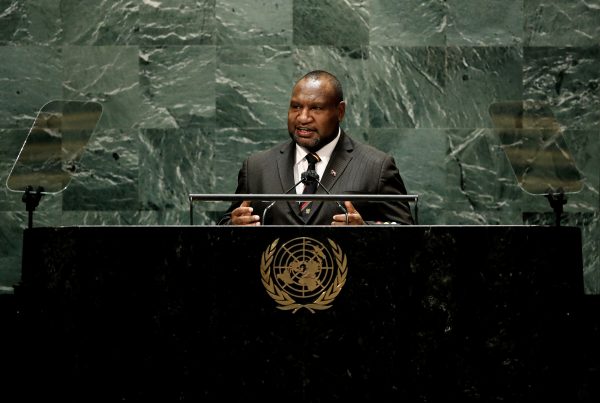As the leader of the party with the most successful endorsed candidates, Pangu Pati, outgoing Prime Minister James Marape was invited to form government and was elected to office unopposed.
Most other seats have since been declared but counting continues in one seat and another has been declared a failed election. Winners have been declared in three seats where some ballot boxes were disputed, and protests from losing candidates can be expected. One winning candidate died before the seat was declared, which will result in a by-election.
Of the 115 seats that have been decided, Pangu Pati holds 39 and the People’s National Congress 16. The United Resources Party won 11 seats, the National Alliance Party five, the People’s Party, the People First Party and the Social Democrat Party each won four seats, and another fourteen parties attained one or two seats. Ten independents have been elected and a number of minor parties and independents will probably join the larger parties in the early months of the new parliament.
As in PNG’s previous elections, just over half of the sitting members retained their seats. The new Parliament has two women parliamentarians — two more than in the 2017–2022 House.
Prime Minister Marape, like all prime ministers before him, heads a coalition of at least 17 parties. Former prime minister Peter O’Neill, who was generally considered to be Marape’s main rival for the office of prime minister, walked out before Parliament voted. O’Neill’s People’s National Congress party, under the leadership of former public servant Joseph Lelang, will form the core of the parliamentary opposition.
Prime Minister Marape will enjoy, as provided by the PNG constitution, an 18-month grace period from no-confidence votes. He now has a comfortable majority in parliament; but he enjoyed a comfortable majority when he became prime minister after Peter O’Neill was forced to resign in 2019 yet faced a vote of no-confidence in April 2021 which he survived by adjourning parliament. Nothing can be taken for granted in Papua New Guinean politics.
The 2017 election was widely described as the worst in PNG’s history. But some observers suggest that the 2022 election marked a further decline in electoral performance and behaviour. The major problems were unsurprising. There were inaccurate electoral rolls which prevented large numbers of people from voting. Polling and vote counting was delayed, in some cases due to action by polling officials who claimed they were owed allowances. There were allegations of irregularities in polling.
These technical issues were worsened by reports of voter intimidation, vote buying, the theft and destruction of ballot boxes, and violence. The election saw several violent incidents including confrontations between supporters and attacks on polling officials by frustrated would-be voters.
Violent incidents occurred not only in recognised — mostly highlands — ‘hotspots’ but notably in Morobe, New Ireland and Port Moresby. These problems occurred despite the presence of around 10,300 police officers, PNG Defence Force personnel and additional logistical support from the Australian Defence Force. Prime Minister Marape has since promised a review and reform of the electoral process, but the problems are deep-seated.
Still, most of the country’s elections were conducted peacefully. The violence that does occur in PNG elections, both during campaigning and polling — and in the aftermath of the election as losing candidates settle scores — is essentially localised.
Based on past election experiences, there will be many petitions lodged by losing candidates through the Court of Disputed Returns, but few will succeed. Many petitions will be withdrawn once winning candidates agree to reimburse their opponents’ campaign costs. Once Parliament has convened and elected a prime minister, political tensions tend to subside — unlike political situations we have seen in Kenya and the United States.
The new Marape government is expected to pursue much the same policies as it pursued during the last parliament. The government stands to benefit from improved commodity prices and the resolution of some of its negotiations with international operators in the mining and petroleum sectors.
But the government still faces high levels of debt and problems in meeting demands for local service delivery, especially in the health and education sectors beset by a rapidly growing population. Marape’s foreign policy will doubtless maintain PNG’s longstanding policy of being ‘friends to all except racist regimes’ — with a focus on its role in the Pacific islands, generally harmonious relations with Australia and engagement with China and its Asian neighbours.
Dr Ronald May is Emeritus Fellow of the Australian National University.

